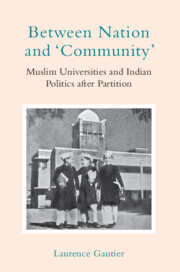Book contents
- Frontmatter
- Dedication
- Contents
- List of figures
- List of tables
- Acknowledgements
- A note on transliteration and translation
- List of abbreviations
- Introduction
- 1 A laboratory for composite India: Jamia Millia Islamia around the time of partition
- 2 Sifting Sir Syed’s legacy: From the ‘arsenal of Muslim India’ to a symbol of India’s national integration?
- 3 Re-legitimising minority rights: The campaign for Aligarh Muslim University’s minority status
- 4 Resisting minority politics, holding on to composite nationalism: Jamia Millia Islamia in the post-Nehruvian period
- 5 Uplifting backward Muslims: The new consensus?
- 6 Bastions of Islam: The defence of Islam as a narrative of empowerment and contestation
- 7 Women in Muslim universities: Guardians of tradition or actors of change?
- Conclusion
- Appendix
- Glossary
- Bibliography
- Index
Conclusion
Published online by Cambridge University Press: 15 April 2024
- Frontmatter
- Dedication
- Contents
- List of figures
- List of tables
- Acknowledgements
- A note on transliteration and translation
- List of abbreviations
- Introduction
- 1 A laboratory for composite India: Jamia Millia Islamia around the time of partition
- 2 Sifting Sir Syed’s legacy: From the ‘arsenal of Muslim India’ to a symbol of India’s national integration?
- 3 Re-legitimising minority rights: The campaign for Aligarh Muslim University’s minority status
- 4 Resisting minority politics, holding on to composite nationalism: Jamia Millia Islamia in the post-Nehruvian period
- 5 Uplifting backward Muslims: The new consensus?
- 6 Bastions of Islam: The defence of Islam as a narrative of empowerment and contestation
- 7 Women in Muslim universities: Guardians of tradition or actors of change?
- Conclusion
- Appendix
- Glossary
- Bibliography
- Index
Summary
This book has highlighted the role of AMU and JMI as political sites that served as symbols for the Muslim community as well as crucibles for competing conceptions of Muslim citizenship and identity in post-independence India. While historical works on post-independence India have largely focused on the long aftermath of partition, this book has shifted attention to the different ways in which these institutions channelled part of the Indian Muslims’ responses to partition as well as to the emergence of the Indian nation state.
The book argued, first, that AMU and JMI constituted platforms to imagine the nation as much as the Muslim qaum. As state-sponsored and Muslim-majority institutions, they found themselves at a symbolic juncture between central state authorities and the Muslim population. After partition, many at JMI and AMU made it their mission to develop an inclusive conception of the nation, of which Muslims would be a full part. In the aftermath of partition, they presented Hindu–Muslim reconciliation as the cornerstone of the nation's construction. At a time when many ordinary and state actors repeatedly questioned Muslims’ Indianness, they articulated composite representations of India's past and culture. In so doing, they asserted Muslims’ right to belong to the Indian nation, thereby rejecting exclusionary interpretations of ‘Indianness’ defined in majoritarian terms.
Their efforts to promote national integration did not result merely from top-down state-driven policies. This book has argued that JMI and AMU members actively contributed, through their educational policies and their interactions with state actors, to shaping ideas of the nation, of secularism and of projects of ‘emotional integration’. In so doing, this work calls for a revision of our understanding of the so-called Nehruvian secularism. Instead of focusing on Nehru alone, it hints at the wide range of actors and institutions, including Muslim ones, involved in the making of the ‘Nehruvian’ discourse on national integration. Just as historians have pointed out the limits of Nehru's capacity to influence Congress party members and state authorities, I suggest that further research is required to locate Nehru within a wider network of institutional and non-institutional actors in order to understand how these different actors contributed to defining what came to be known as the ‘Nehruvian’ discourse on national integration.
- Type
- Chapter
- Information
- Between Nation and ‘Community'Muslim Universities and Indian Politics after Partition, pp. 406 - 421Publisher: Cambridge University PressPrint publication year: 2025



